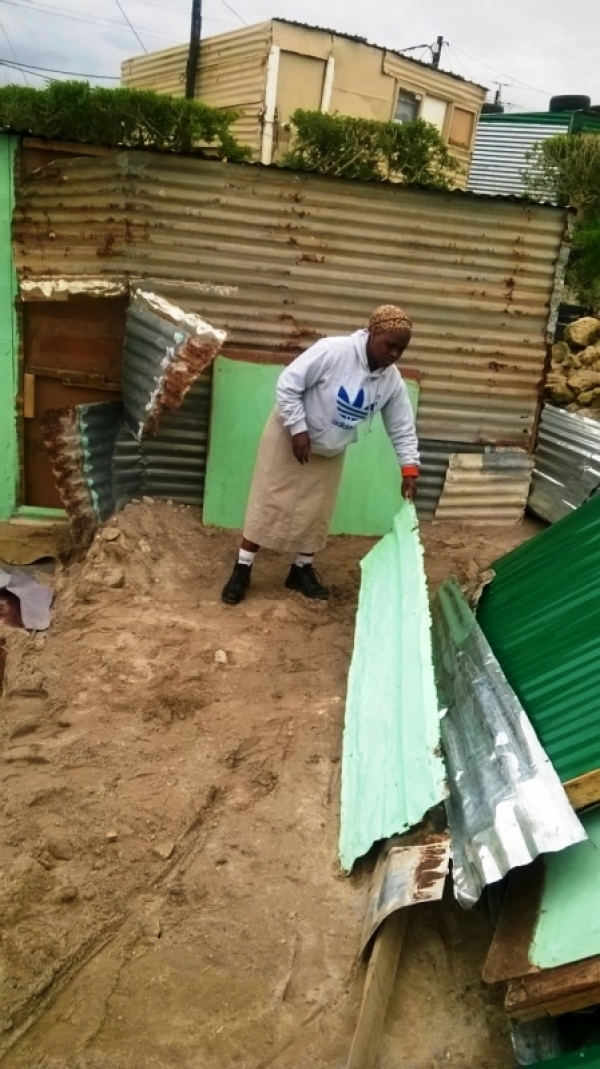Monwabisi Park residents lay charges against city law enforcement

On Friday, a number of community members from Monwabisi Park informal settlement laid a charge of malicious damage to property against City of Cape Town law enforcement after shacks were destroyed by the Anti-Land Invasion Unit (ALIU) last Wednesday.
The residents claim they were given permission to extend their shacks by the ward development forum (WDF) committee members, following a WDF meeting with the City last year and earlier this year.
Residents say committee members told them that the City gave permission to extend their shacks and change old materials on the one condition that each shack has no more than one door.
Veliswa Matafileni says she’s been living in her shack since 2006. Two months ago she extended it with a one-room shack she received from a pastor in the area.
“I was happy because my shack has been leaking for a very long time. My material was very old. I used the new shack to extended the two-room shack I had,” says Matafileni.
She says she has done nothing wrong. “I was so confused when law enforcement came to destroy our shacks. No explanation was given to us; they just destroyed everything; no warning; no questions were asked,” she says.
Another resident, Thembile Vikiva, says he lost all his new material and some of his belongings inside the shack. “The way they destroyed our shacks, it looked like they didn’t care. They didn’t care how much the material cost; they just destroyed.”
Vikiva tried to intervene for his neighbour.
“I told these people [ALIU) that my neighbour lives in that shack. She removed the old shack and put the new one, but they refused to listen. They just destroy and move to the next shack,” he says.
Vikiva’s neighbour was not home when her shack was destroyed.
Fundiswa Nogemane says her shack has been there for more than five years, but because it was painted with the same colour as the new shacks, law enforcement also destroyed it.
“They broke my tiles that were inside the shack. I told them that my shack is old but they didn’t care to listen,” she says.
Matafileni says they want the City to compensate them for the building material. “They can’t give us permission to extend [then] next thing they destroy our homes … How can they expect us to continue to live in old shacks,?”
Ward 99 Development Forum chairperson Nkosinathi Qwayi confirmed the claim that the City agreed that the WDF could “let people extend their shacks and change the old material on a condition that they will put only one door.”
He said he was also shocked when he heard about the six shacks destroyed last week.
“What is strange about this is that only six shacks were destroyed, but a number of people extended their shacks. Why only these six?” he asked.
City’s Mayoral Committee Member for Human Settlements Councillor Benedicta van Minnen said the ALIU was informed of seven illegal, unauthorised structures which were in the process of being erected, of which three were illegal new extensions onto existing structures.
Contradicting the residents, Van Minnen said community members were instructed to remove the illegal structures.
“Four of the partially built structures were removed by those who were in the process of erecting the structures, while the ALIU removed the three partially built and incomplete structures after the warning to remove the structures was given,” said Van Minnen.
She said the City did explain to the community that they may not illegally take possession of City-owned land and therefore may not erect structures on that land even if an outside organisation has donated the material.
Van Minnen said the community had been advised to contact Informal Settlement Management Department to obtain permission to build approved extensions onto the existing structures.
She said: “The system of obtaining permission is vital to prevent the proliferation of informal settlement as the illegal occupation of land most often results in poor access to City services, continual flooding, high crime rates and poor connections with economic opportunities.”
Van Minnen said when a request is made to extend a structure, the department looks at whether it is to accommodate family members, such as grandparents, or if it is for financial gain.
She said, where no written application has been made, the ALIU is called in.
Police spokesperson Lieutenant Colonel Andre Traut said Harare police are investigating a case of malicious damage to property after shacks were demolished. He said the investigation continues.

This article is licensed under a Creative Commons Attribution-NoDerivatives 4.0 International License.


